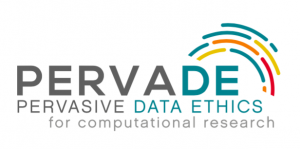From mobile phone apps to website search engines, wearable technology to social platforms, consumer information has become highly trackable and available, resulting in an ethically questionable free-for-all in research and marketing. But consumers aren’t the only ones concerned about how their personal information is being collected and used. The University of Maryland’s College of Information Studies has formed a project team with five other research institutions to explore the ethics of how these data are captured and used. 
The four-year project, PERVADE (Pervasive Data Ethics for Computational Research), was awarded a $3 million grant from the National Science Foundation in August 2017. Prior research on ethics of large and pervasive data has hit roadblocks caused by a lack of empirical knowledge. The PERVADE team looks to “reveal ethical practices and norms to guide those who utilize big data and to inform policymaking and regulation,” says Dr. Katie Shilton, Associate Professor in the College of Information Studies at UMD and principal investigator on the grant.
PERVADE brings together a multi-disciplinary team with expertise in computational science, research ethics, data practices, law and policy, health information, social computing, qualitative and quantitative research methods, and data privacy:
Dr. Katie Shilton – College of Information Studies at the University of Maryland College Park
Dr. Jessica Vitak – College of Information Studies at the University of Maryland College Park
Dr. Matthew Bietz – Department of Informatics at the University of California, Irvine
Dr. Casey Fiesler – Department of Information Science, College of Media, Communication and Information at University of Colorado Boulder
Dr. Jacob Metcalf – Data & Society Research Institute
Dr. Arvind Narayanan – Department of Computer Science at Princeton University
Dr. Michael Zimmer – School of Information Studies at the University of Wisconsin-Milwaukee
The project’s research focus will extend across consumers, big data researchers, commercial providers, and  regulators, both domestically and internationally, to explore how these diverse stakeholders understand their ethical obligations and choices, and how their decisions impact data system design and use.
regulators, both domestically and internationally, to explore how these diverse stakeholders understand their ethical obligations and choices, and how their decisions impact data system design and use.
Specific issues that the PERVADE team will examine include how people experience the reuse of their personal data; what social factors influence people’s willingness to share their data; how and when consent should be given; and how consumers’ concerns can be shared with data system designers and big data researchers.
“By empowering researchers with information about the norms and risks of big data research, we can make sure that users of any digital platform are only involved in research in ways they don’t find surprising or unfair,” Dr. Shilton says.
The team aims to use project findings to guide best practices for each stakeholder group using decision-support tools, risk measurement methods, public educational materials, and an open dataset of findings by the end of the project in 2021.